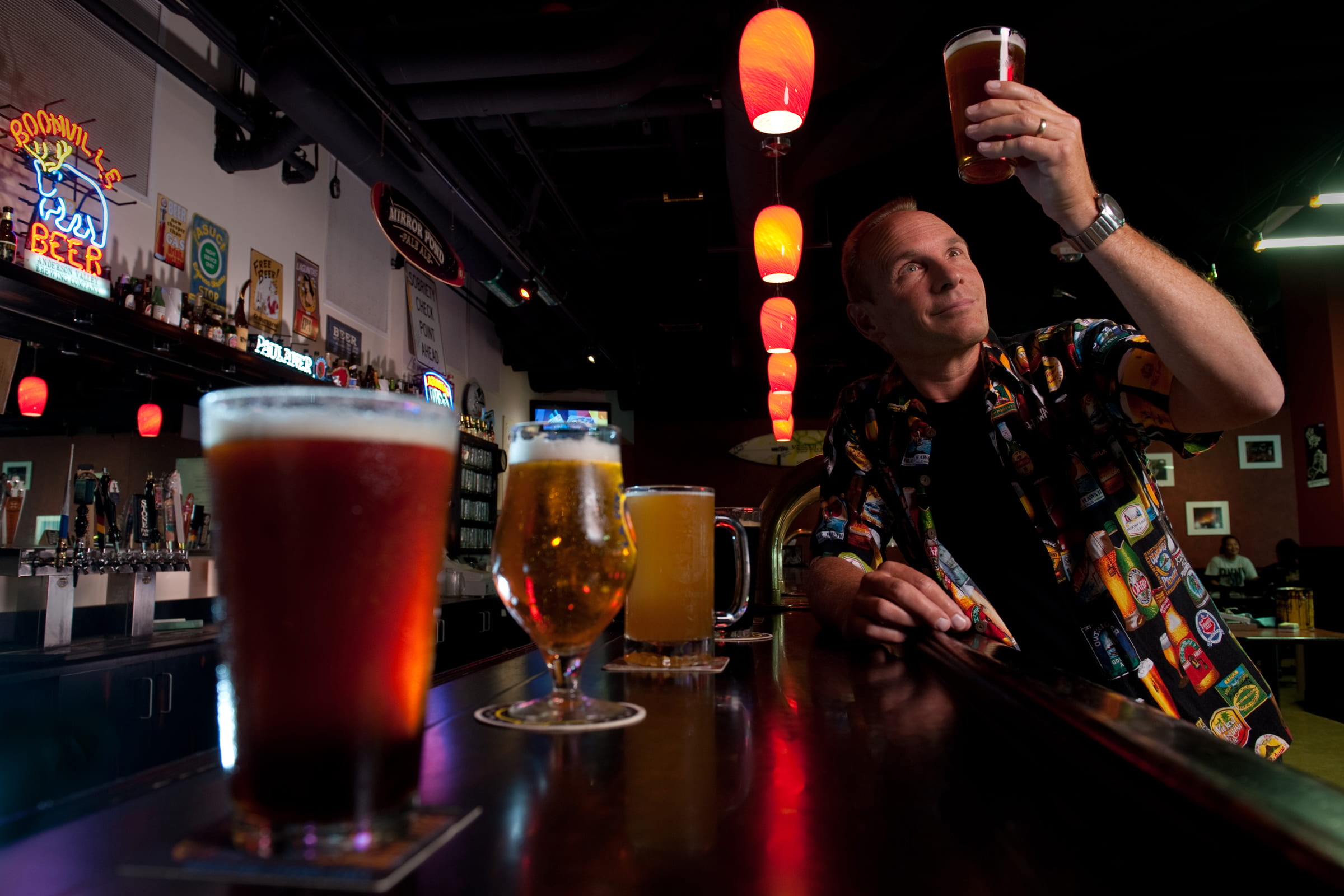Plato meets pilsner

Like many a philosopher, UC Irvine alumnus Matt Lawrence, Ph.D. ’99 likes to ruminate on life’s deepest questions – preferably over a nice, cold beer. Now he’s paired his study of what ails humanity with his interest in ales – as well as lagers, stouts and porters.
In Lawrence’s new book, Philosophy on Tap: Pint-Sized Puzzles for the Pub Philosopher, he matches select beers with classic conundrums about morality, mortality, God’s existence, free will, the nature of the soul, time travel, and other issues that have fomented debate in classrooms – and bars – throughout the ages.
“The book covers 48 philosophical puzzles and 48 beers – as opposed to, say, an even 50 – because that amounts to two cases of beer,” Lawrence explains.
Among the big concepts and questions covered in small, easy-to-digest chapters: “If God exists, why are there bad beers?” and “Is your next round totally predictable?” and “Does time exist? What about happy hour?” and, in a twist on a famous Zen koan, “What is the sound of one glass clinking?”
Lawrence pairs each query with a beer, typically basing his choice on its name, origin or style (though taste is important too). For an entry on morality, for example, he selected Wasatch’s Polygamy Porter, and for a chapter on the meaning of life, he picked Deschutes Brewery’s imperial stout The Abyss.
“I wanted a dark, murky beer to help you get to the bottom of it all,” Lawrence says. “An abyss is a big cavern you can fall into, so I liked the name. Then, once I tasted it, it was a done deal.
“I chose Victory Brewing Company’s HopDevil IPA because it goes nicely with the problem of evil: ‘If God exists and loves us, why are there bad beers? Can we just blame it all on Satan, or some kind of hop devil?’ And for the question ‘Is pleasure the only thing that truly matters?’ I went with Young’s Double Chocolate Stout. It’s a rich and decadent beer that naturally takes the mind to the topic of hedonism.”
While his method might be lighthearted, Lawrence has a serious mission: to get more people interested in philosophy. (To foster spirited philosophical discourse, he’s held a beer tasting for the UCI Alumni Association and in the spring will teach a mini-course based on his new book for the Osher Lifelong Learning Institute – with, of course, more beer tasting.)
He acquired a taste for fine beer while pursuing his doctorate at UCI, when he and his fellow grad students would adjourn to the Anthill Pub or Steelhead Brewery and wax philosophic over a mug or three.
“I first got adventurous during these nights of philosophical discussion at the pubs,” says Lawrence, now a philosophy professor at Long Beach City College.
He got the idea for Philosophy on Tap two years ago on his way to a weekend meditation retreat in San Diego County. He’d started a book of short philosophical puzzles, but the project had stalled.
“I felt that I needed some kind of overarching theme to make it different from other philosophy books,” Lawrence says.
It wasn’t the meditation that cured his writer’s block – it was what he saw on the drive south through Escondido: Stone Brewing Co.
“The smell of hops must have wafted through my window,” he recalls. That got him thinking: His puzzles were not just concise; they were pint-sized – short enough to read and contemplate within the time it takes to quaff a beer. By matching each conundrum with a relevant “pint of the puzzle,” he could serve up two cases’ worth of philosophy.
Lawrence began studying and sampling beers, visiting brewpubs and becoming a frequent customer at the Hi-Time wine and beer shop near his Costa Mesa home. This relationship eventually led Hi-Time to offer special Philosophy on Tap beer packs through its website, making it easier for readers to buy the beers cited in the book – some of which can be tricky to find.
“It was tough research,” Lawrence jokes. “I’d look for beers online that had a good reputation, and then I’d try them myself. Everyone has his preferences, and even the experts sometimes disagree. For instance, I tried one super-hopped beer that had received some rave reviews online. But to me, it tasted like someone had just mowed the lawn – in my mouth!”
Those brews that made it into the book represent a broad range of styles and regions, from pale ales to espresso stouts.
“I intentionally selected 24 beers from American craft brewers and 24 from brewers around the world,” Lawrence says. “I tried to make it a true beer exploration.”
His previous book, Like a Splinter in Your Mind, examined the philosophical ideas in the“Matrix” movies as a way to make serious concepts accessible to the lay reader. Although Lawrence doesn’t know what subject he’ll tackle next, it’s bound to be something students will like as much as beer.
“I want to bring philosophy to a popular audience,” he says. “That’s the main thing my writing is about: drawing people in.”
Originally published in ZotZine Vol. 4, Iss. 2

